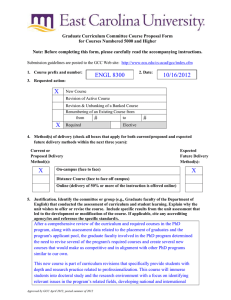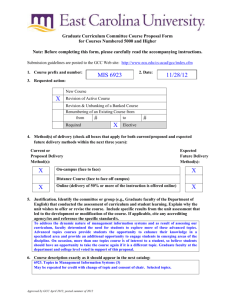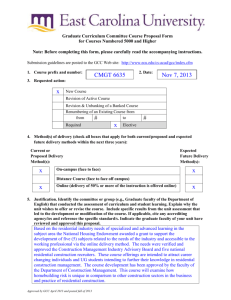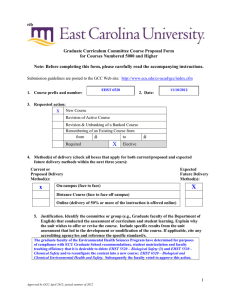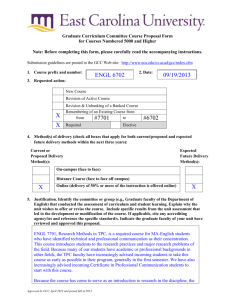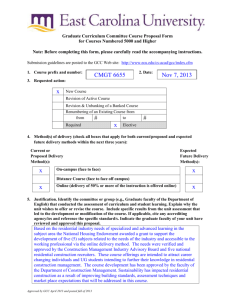ENGL 8601 (to 7600)
advertisement
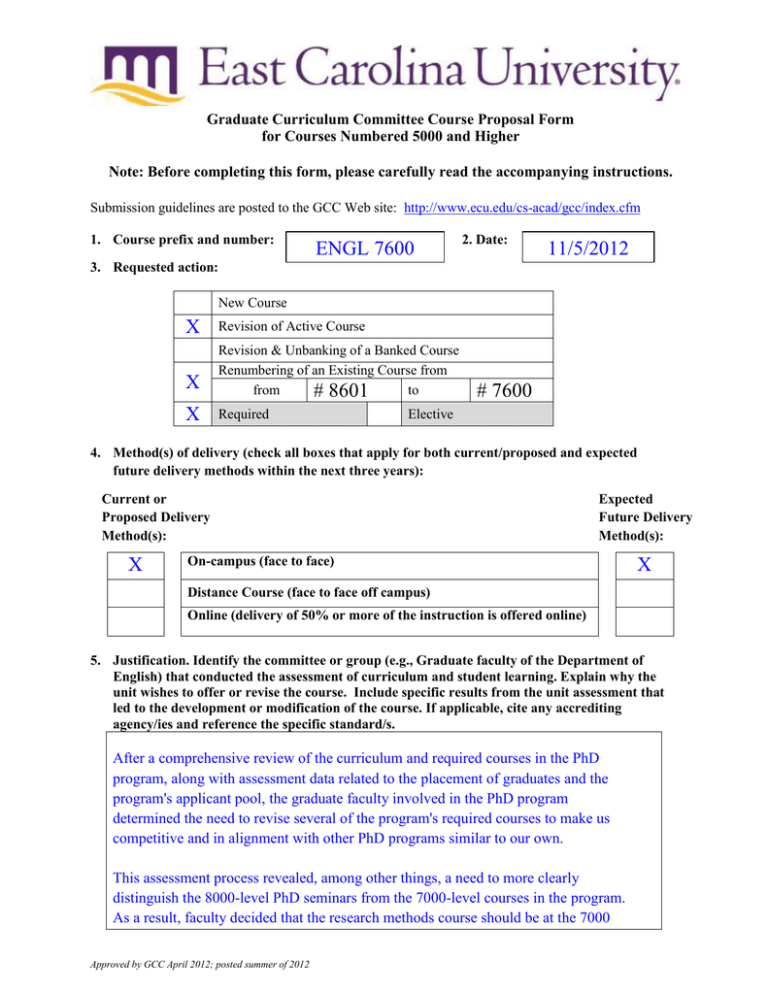
Graduate Curriculum Committee Course Proposal Form for Courses Numbered 5000 and Higher Note: Before completing this form, please carefully read the accompanying instructions. Submission guidelines are posted to the GCC Web site: http://www.ecu.edu/cs-acad/gcc/index.cfm 1. Course prefix and number: ENGL 7600 2. Date: 11/5/2012 3. Requested action: New Course X X X Revision of Active Course Revision & Unbanking of a Banked Course Renumbering of an Existing Course from from to # 8601 Required # 7600 Elective 4. Method(s) of delivery (check all boxes that apply for both current/proposed and expected future delivery methods within the next three years): Current or Proposed Delivery Method(s): X Expected Future Delivery Method(s): On-campus (face to face) X Distance Course (face to face off campus) Online (delivery of 50% or more of the instruction is offered online) 5. Justification. Identify the committee or group (e.g., Graduate faculty of the Department of English) that conducted the assessment of curriculum and student learning. Explain why the unit wishes to offer or revise the course. Include specific results from the unit assessment that led to the development or modification of the course. If applicable, cite any accrediting agency/ies and reference the specific standard/s. After a comprehensive review of the curriculum and required courses in the PhD program, along with assessment data related to the placement of graduates and the program's applicant pool, the graduate faculty involved in the PhD program determined the need to revise several of the program's required courses to make us competitive and in alignment with other PhD programs similar to our own. This assessment process revealed, among other things, a need to more clearly distinguish the 8000-level PhD seminars from the 7000-level courses in the program. As a result, faculty decided that the research methods course should be at the 7000 Approved by GCC April 2012; posted summer of 2012 and required for all PhD students. MA students will also be able to take the course. Students will meet one of the program outcomes, “Design and conduct an original long-term research project of substantial scope, synthesize information resulting from that project, and report the results of that project to other members of the academic community” by taking this course. The Doctoral Program Steering Committee, the Graduate Committee, and the Graduate Faculty approved this course on November 25, 2012 and December 3, 2012. 6. Course description exactly as it should appear in the next catalog: 7600. Research Methods in Rhetoric, Writing, and Professional Communication (3) Formerly ENGL 8601 Principles and techniques in research methods. 7. If this is a course revision, briefly describe the requested change: This survey of research methods course is being moved to the 7000 level, and the title is changing to be consistent with the revised name of the PhD program. 8. Course credit: Lecture Hours 3 3 Weekly OR Per Term Credit Hours Lab Weekly OR Per Term Credit Hours s.h. Studio Weekly OR Per Term Credit Hours s.h. Practicum Weekly OR Per Term Credit Hours s.h. Internship Weekly OR Per Term Credit Hours s.h. Other (e.g., independent study) Please explain. Total Credit Hours 9. Anticipated annual student enrollment: 10. Changes in degree hours of your programs: Degree(s)/Program(s) Changes in Degree Hours 11. Affected degrees or academic programs, other than your programs: Degree(s)/Program(s) Changes in Degree Hours 12. Overlapping or duplication with affected units or programs: Approved by GCC April 2012; posted summer of 2012 s.h. s.h. 3 12 s.h. X Not applicable Documentation of notification to the affected academic degree programs is attached. 13. Council for Teacher Education (CTE) approval (for courses affecting teacher education): X Not applicable Applicable and CTE has given their approval. 14. University Service-Learning Committee (USLC) approval: X Not applicable Applicable and USLC has given their approval. 15. Statements of support: a. Staff X Current staff is adequate Additional staff is needed (describe needs in the box below): b. Facilities X Current facilities are adequate Additional facilities are needed (describe needs in the box below): c. Library X Initial library resources are adequate Initial resources are needed (in the box below, give a brief explanation and an estimate for the cost of acquisition of required initial resources): d. Unit computer resources X Unit computer resources are adequate Additional unit computer resources are needed (in the box below, give a brief explanation and an estimate for the cost of acquisition): e. ITCS resources X ITCS resources are not needed The following ITCS resources are needed (put a check beside each need): Mainframe computer system Statistical services Network connections Computer lab for students Software Approval from the Director of ITCS attached 16. Course information (see: Graduate Curriculum and Program Development Manual for instructions): Approved by GCC April 2012; posted summer of 2012 a. Textbook(s) and/or readings: author(s), name, publication date, publisher, and city/state/country. Include ISBN (when applicable). Hughes, Michael A. and George F. Hayhoe. A Research Primer for Technical Communication. New York: Routledge, 2009. ISBN 0805861149. Required. Nickoson, Lee, and Mary P. Sheridan. Eds. Writing Studies Research in Practice: Methods and Methodologies. Edwardsville, Southern Illinois UP, 2012. ISBN 0809331144. Required. Bazerman, Charles and Paul Prior, Eds. What Writing Does and How It Does It: An Introduction to Analyzing Texts and Textual Practices. New York, Routledge, 2003.ISBN 0805838066. Required. b. Course objectives for the course (student – centered, behavioral focus) If this is a 5000-level course that is populated by undergraduate and graduate students, there must be differentiation in the learning objectives expected. Upon completion of this course, students will be able to: 1. Recognize and articulate the primary epistemologies at work in the various research methods and methodologies used in rhetoric, writing, and professional communication. 2. Analyze and critique research studies in rhetoric, writing, and professional communication pertinent to their research interests. 3. Choose an appropriate research question and the methodology/methods that can be used to answer it; 4. Evaluate the ethical dimensions of conducting different kinds of research. 5. Complete Institutional Review Board (IRB) educational modules and a protocol application. 6. Locate, evaluate, and synthesize primary and secondary, print and electronic bibliographic sources that contribute significantly to research projects developed in consultation with the professor. 7. Propose a research project in rhetoric, writing, and professional communication, which demonstrates the student's understanding of the methodological complexities involved in conducting, assessing, and publishing the research. c. Course topic outline The list of topics should reflect the stated objectives. Unit 1: Defining Research in Rhetoric, Writing, and Professional Communication (Texts, Communication, People, Places, Organizations, Digital Environments) Unit 2: Textual/Content Methods (Rhetorical Analysis, Discourse Analysis, and Historical/Archival Research, Genre Analysis, Digital/Visual/Web/New Media) Unit 3: Social Methods (Ethnographic, Case Study, Surveys, Interviews, Activity Methods) Unit 4: Action Research (Teacher Inquiry, Community Engagement, Programmatic Assessment) Approved by GCC April 2012; posted summer of 2012 Unit 5: Quantitative Research (Experimental, Quasi-Experimental) Unit 6: Research Paradigms (Theories/Lenses) d. List of course assignments, weighting of each assignment, and grading/evaluation system for determining a grade Assignments Research Blog/Reading Responses 20% Journal Survey 20% Annotated Bibliography/Research Question 20% Research Project Article/Report 30% Class Professionalism/Citizenship 10% Grading Scale A = 90 – 100 B = 80 – 89 C = 70 – 79 F = 69 or lower Approved by GCC April 2012; posted summer of 2012
